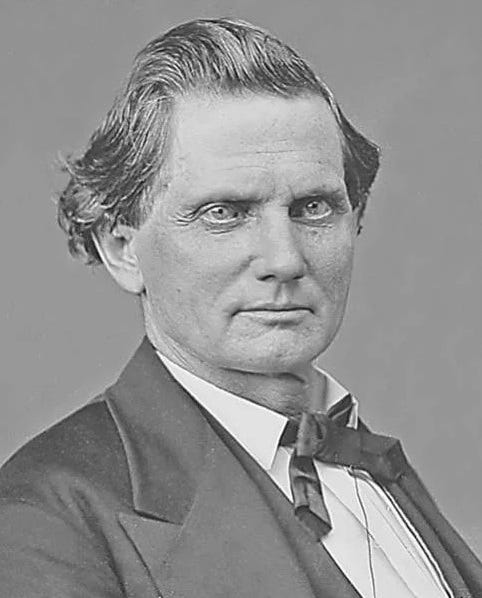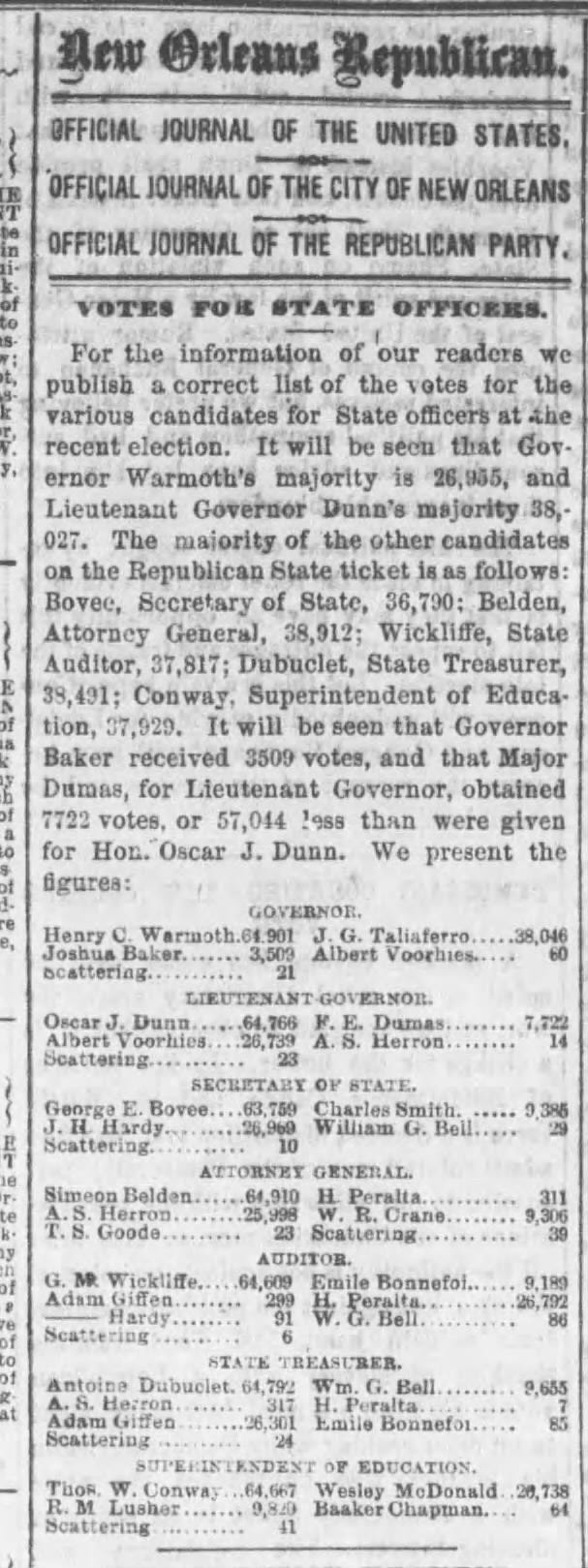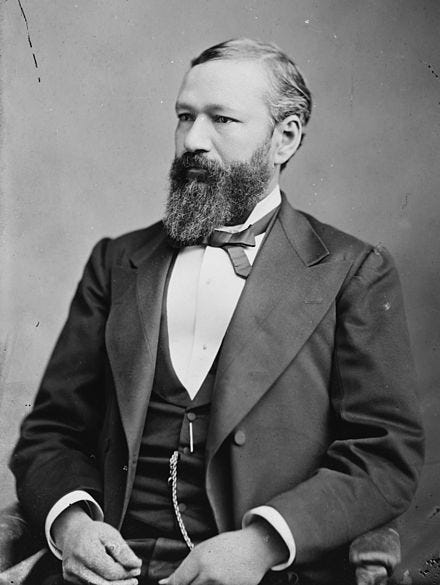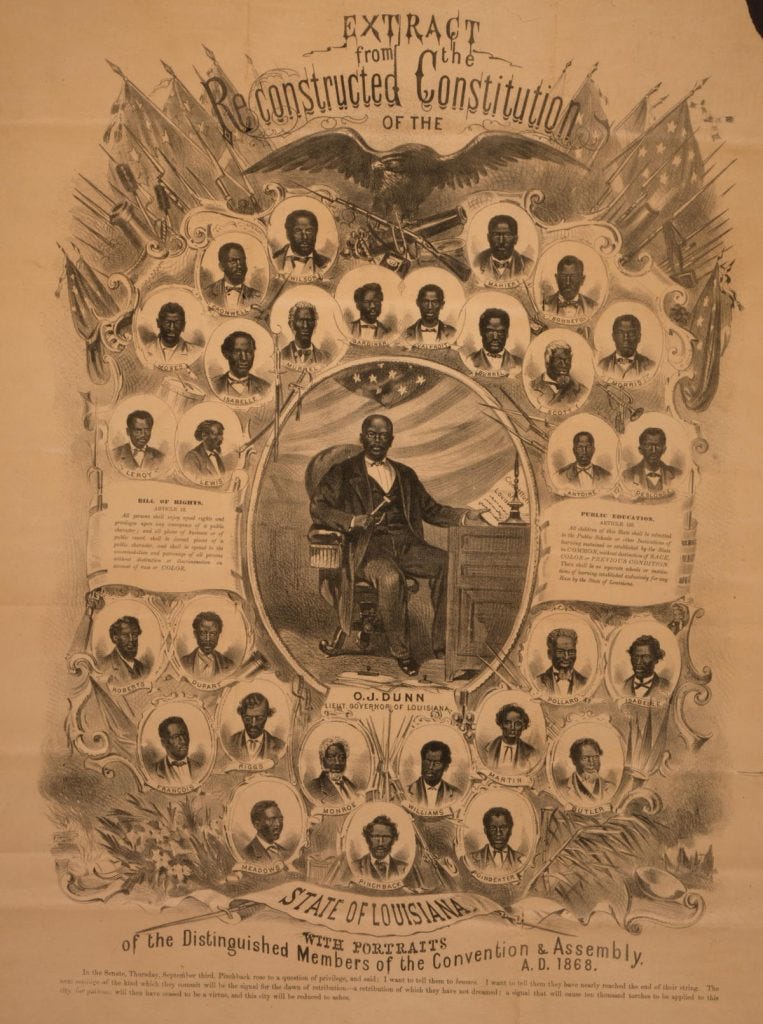Oscar James Dunn
The incredible, yet, short lived life of the 1st Black Lieutenant Governor in the United States
Have you heard of Oscar Dunn? I hadn’t.
Oscar Dunn was born a slave around 1822 to an enslaved woman Maria and a free man James Dunn. By 1832, James, Oscar’s father, had earned enough money to purchase the freedom of his wife and their two children for $800. From this purchase, Oscar became free at age 11 which allowed him to go to school and function as a free person of color.
Later, he learned a trade, plastering, and became the head of the Black Masonic Lodge of Louisiana. Here he established a wide base in the Black community which set the stage for his political future.
At the end of the Civil War, he opened an employment agency where freed men and women could be hired to assist businessmen and plantation owners.
After the Reconstruction Acts of 1867 was passed, Dunn was elected to the New Orleans City Council. His work there laid the foundation of the educational system, and it was important to him that schools were integrated. He felt that it was easier to teach children about equality than adults and if they start young, it would set a foundation for their future.
Dunn was very active in local, state and federal politics. When Union army officer Francis E. Dumas declined the nomination for lieutenant governor, Dunn ran on a ticket with Henry C. Warmoth, a young white politician from Illinois who was 20 years younger than Dunn.
They won the election. Oscar Dunn defeated white candidate W. Jasper Blackburn.
Dunn took office as the first Black Lieutenant Governor on July 11, 1868. Not only for Louisiana but the first in the United States.
Dunn was very popular. He even had connections to U.S. President Ulysses S. Grant. He visited him at the White House on April 2, 1869.
In 1871, Dunn became the first Black acting governor of a U.S. state after Governor Warmoth injured his foot and left Louisiana to recuperate on two occasions. Dunn served as acting governor of Louisiana for a total of 39 days.
Now, let that sink in. Not only was he elected lieutenant governor, but served as governor when Warmoth had to step away. A Black man in the 1800s. Say what?!
While in office as Lieutenant Governor, he also was a member of the Printing Committee of the legislature, which controlled a million-dollar budget. He also served as President of the Metropolitan Police which had an annual budget of nearly one million dollars.
I mention this because there are many times where Black people, especially during this time period, were not given responsibility or trusted to be responsible for budgets of this magnitude. This really showed what type of person he must have been and his character. Highly respected and much loved.
However, he did not kowtow. He called a spade a spade when necessary.
Now you would think that a governor and their lieutenant governor would see eye to eye on policies. This wasn’t the case with Governor Warmoth and Dunn. Warmoth after being elected quickly showed his hand that he was not for Black people. Warmoth disagreed on civil rights matters, with Dunn describing him as “the first Ku-Klux governor of the party he has disgraced.”
Warmoth had been criticized for appointing white Democrats to state positions, encouraging alliances with Democrats, and his failure to advance civil rights for Blacks.
Here is where it gets even more interesting and I’m not really clear on this pairing but Warmoth joined forces with P.B.S. Pinchback, a Black political rival of Dunn’s. I need to do more research on Pinchback’s political beliefs and I plan on writing about him for my next Substack article.
Yes, Pinchback completely looks white. His mother was enslaved and got pregnant by her master. Again, I’m going to write about Pinchback next because he actually became Louisiana’s first Black governor.
Pictured below is Dunn in the center and Pinchback at the very bottom underneath Dunn.
Back to Dunn.
Warmoth and Pinchback colluded to tarnish the reputation of Dunn by alleging corruption and scandal within his family.
These weren’t Dunn’s only enemies.
Dunn made numerous political enemies during this period. According to The New York Times, Dunn “had difficulties with Harry Lott,” a Rapides Parish member of the Louisiana House of Representatives. And his relationship with President Ulysses S. Grant may have caused envy. When the Vice President Schuyler Colfax announced he would retire, rumors circulated that Grant may appoint Frederick Douglass, Hiram Revels or Oscar Dunn as Vice President. So the jealousy around Dunn was real.
Haters are gonna hate and maybe even kill.
On November 22, 1871, Dunn died at home, at age 49, after a brief and sudden illness. He became sick after having dinner. He had been campaigning for the upcoming state and presidential elections. Many believed that he was poisoned by political enemies, but no evidence was found. However, his symptoms were very consistent with arsenic poisoning. He was vomiting and shivering.
Only four out of the seven doctors who examined Dunn signed off on the official cause of death, suspecting murder. No confirmation was made because Dunn's family refused an autopsy.
Over 50,000 people turned out for Dunn’s funeral. Governor Warmoth surprisingly was one of the pallbearers. It really puzzles me that his family refused an autopsy. Who knows what pressures or possible threats they may have been under? And to dig deeper into his death, may have threatened their lives as well.
Later that year, $10,000 was appropriated by Louisiana State Legislature Act 57 to erect a monument to Dunn. However, the monument was never erected and still to this very day it has not been done.
I’m so fascinated by Dunn and the many Black political figures during the Reconstruction Era. Their incredible resilience during such turbulent times just blows my mind. Please share these stories.
My hope is that these figures will become household names for this generation and generations to come.
For more information on Oscar Dunn, check out the graphic novel written by one of his descendants. Monumental: Oscar Dunn and His Radical Fight in Reconstruction Louisiana.
(This is an affiliate link)
If you like this article, please ❤️ and comment.
It helps the algos.
Best,
Danita
Resources











Another incredible story! I agree with all your comments on the facts. So many confusing details. But, starting with becoming a father at 11 and buying his wife from enslavement, that is just incredible. His statue needs to be erected! Also, it definitely sounds like he was murdered. I wonder where his ancestors are now? I love the way you write and the subjects you choose, the stories you excavate. Keep going!! We need to hear them!!
What great research. Danita, this is an opinion only. If I had been his family, I would not allow anyone near his body. It would be another chance to desecrate him. I wonder if his speeches were written down? Or administrative letters still available.